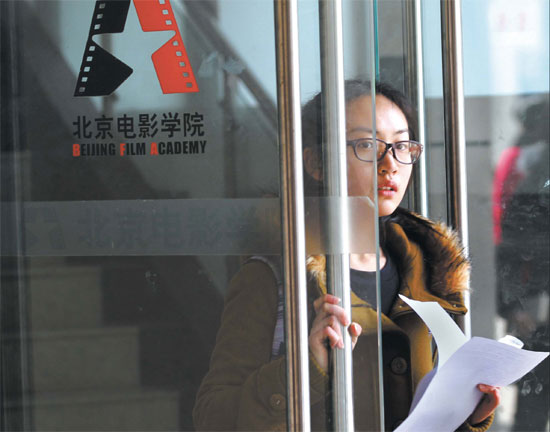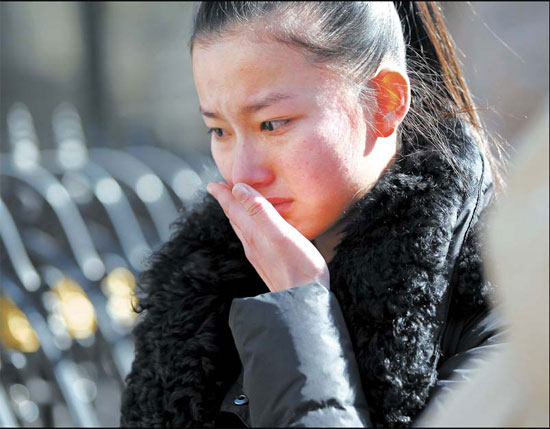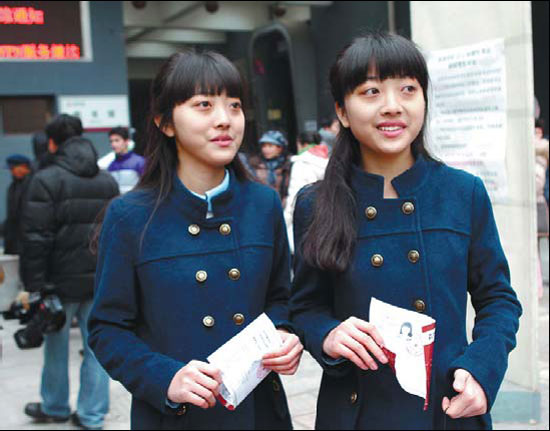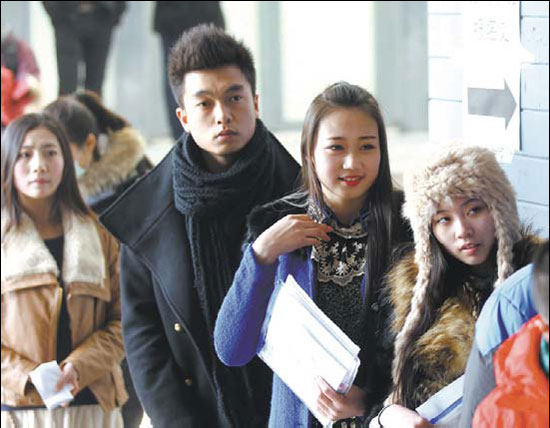Reaching for the stars
Updated: 2013-02-27 07:35
By Liu Wei and Han Bingbin (China Daily)
|
||||||||
|
For many Chinese youngsters, the road to fame usually starts from a prestigious acting school like the Beijing Film Academy. Photos by Zou Hong / China Daily |
|
A young applicant weeps at the gate of the Central Academy of Drama after missing the deadline for the interview. |
|
Zhang Lin (left) and her twin sister Zhang Lu from Beijing prepare for the preliminary acting exam. |
|
Eager applicants face strong competition - only 75 out of about 4,500 will get into the Beijing Film Academy. |
For aspiring actors and the schools they hope will launch them, spring is a season of infinite hope, Liu Wei and Han Bingbin report.
'Where the Chinese and the world's dreams begin." That is boldly blazed on a banner outside the main building of the Beijing Film Academy, one of China's most prestigious colleges for performing arts. That may sound like an overstatement to some, but others find a common note. The college is now recruiting students for the new semester, and there is no lack of eager applicants. Acting has always been the most popular major - only 75 of 4,569 applicants will get in - and all hope to follow star graduates like Zhao Wei and Xu Jinglei.
The competition in another major college for performing arts, the Central Academy of Drama, is no less fierce. About 9,000 aspirants applied to enter the acting faculty; only 50 will win a place.
Entering such schools fits many of the criteria of dreams: glamorous, mysterious and tough to achieve. The competition even starts before the real tests begin.
Most of China's colleges for performing arts start their recruitment (yikao in Chinese) around February, four months before the entrance exams at most universities.
Every spring these exams, especially those at the Beijing Film Academy and the Central Academy of Drama, are sure to make headlines. The aura of stellar potential and the images of good-looking young men and attractive young girls are major draws for public attention.
Reporters hound the school gates, along with the anxious parents of applicants.

In the chill winds of early spring, they both wait for the same group of people - the young aspirants inside.
Many youngsters have learned the importance of media attention even before they become stars. They are ready to show off their beauty, talent and courage before the cameras.
The stardom-seeking fever even generates peripheral industries.
Outside Beijing Film Academy on Feb 20, one day before the 2013 acting exam, there were about 10 vendors selling copies of the previous years' test questions all along a 50-meter stretch .
Five pages cost 30 yuan ($4.80), almost the price of a book. Books titled How To Be an Actor, and Entering Beijing Film Academy were also being waved about.
Preparation for yikao could start as early as three months before. Most applicants will attend so-called training classes for acting, which cost at least 5,000 yuan for a month.
The colleges do not appreciate or support this extra acting training, however.
Zhao Ningyu, professor at the Communication University of China's directing and acting department, and a graduate of Beijing Film Academy himself, calls the training "misleading".
"Now all the students play the same roles in the test - thieves, lunatics and fools are the most popular ones," he says.
Usually the acting exams include reading a poem, singing, dancing and a short skit.
Zhao has discovered that many applicants have spent a whole year preparing one poem or a dance sequence. When asked to do something impromptu, they panic.
Those who travel from outside Beijing have to rent houses to attend the training classes and the exams that follow.
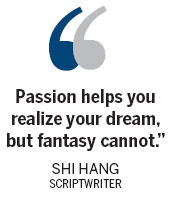
Ma Junzhen, a 60-year-old former cleaner at the Central Academy of Drama, earns at least 3,600 yuan a month renting out her modest 9-square-meter lodging nearby.
Feeding the star fever is the booming entertainment industry of China. The annual film box-office sales have risen 30 percent since 2003 to reach 16 billion yuan ($2.57 billion) in 2012. The second largest film market in the world, only after the United States, offers not just dreams, but real jobs.
The most likely way for them to enter the industry is to enter a prestigious acting school, which is very difficult in China.
"Although about 400 colleges in China have acting courses, few of them are able to offer really quality art education," says Zhao of the Communication University of China.
"As a result, the diplomas of the few top colleges, such as Central Academy of Drama and Beijing Film Academy, are widely seen as having high credibility in show business. Graduates of the two schools are more likely to have access to jobs and useful connections, either through teachers, classmates or alumni."
However, graduating from these schools does not guarantee stardom.
Shi Hang, a senior scriptwriter and graduate of Central Academy of Drama, recalls that many of his alumni who majored in acting ended up in totally unrelated businesses. He says students and parents should have a more sensible attitude toward the profession.
"Passion helps you realize your dream, but fantasy cannot," he says.
"This is a tough road, and a risky gamble. Only a few at the top of the pyramid can become superstars. Most of these aspirants will be disappointed."
Damien Lu, PhD and professor at the School of Theatre, Film and Television at UCLA, agrees.
"Acting is a highly competitive business everywhere in the world, so many talented people would not get a chance to act," he writes in an e-mail response to China Daily.
One who tries to make acting a career in the United States does not have to go to certain schools, he adds, but needs to be a self-disciplined and determined learner.
"School degrees are not required, although in some instances it can help, not because of the degree itself but because of the specialized training one receives," he writes.
"Being an actor is like being an athlete, one is always in training to hone one's craft, like an athlete training for the Olympics."
Contact the writers at liuw@chinadaily.com.cn and hanbingbin@chinadaily.com.cn.
(China Daily 02/27/2013 page18)

 In Photos: 7.0-magnitude quake hits Sichuan
In Photos: 7.0-magnitude quake hits Sichuan
 Li Na on Time cover, makes influential 100 list
Li Na on Time cover, makes influential 100 list
 FBI releases photos of 2 Boston bombings suspects
FBI releases photos of 2 Boston bombings suspects
 World's wackiest hairstyles
World's wackiest hairstyles
 Sandstorms strike Northwest China
Sandstorms strike Northwest China
 Never-seen photos of Madonna on display
Never-seen photos of Madonna on display
 H7N9 outbreak linked to waterfowl migration
H7N9 outbreak linked to waterfowl migration
 Dozens feared dead in Texas plant blast
Dozens feared dead in Texas plant blast
Most Viewed
Editor's Picks

|

|

|

|

|

|
Today's Top News
Live report: 7.0-magnitude quake hits Sichuan, heavy casualties feared
Boston suspect cornered on boat
Cross-talk artist helps to spread the word
'Green' awareness levels drop in Beijing
Palace Museum spruces up
First couple on Time's list of most influential
H7N9 flu transmission studied
Trading channels 'need to broaden'
US Weekly

|

|
